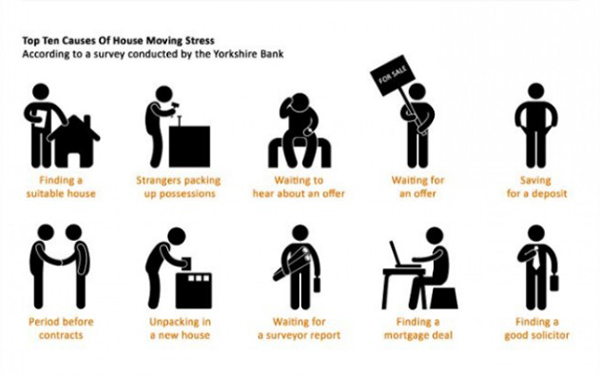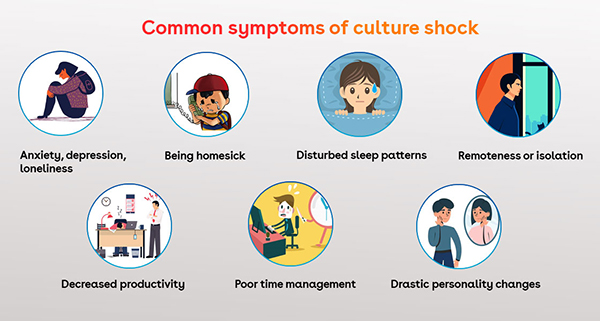
An Expat’s Guide to Culture Shock
So. You’ve moved to a new country. Congratulations…this is a big deal. You’re slowly settling in and adjusting to your new surroundings. Everything feels new! Everything is fascinating! You’re psyched to be beginning this new adventure! Sure, you’d heard about the “honeymoon phase” of well, anything new, but you’re not worried. Culture shock will never happen to you, in this unbelievable place…doing all the incredible things that you’d dreamt of doing for so long. You will surely avoid the famous culture shock phases and the examples you’ve heard about are not relevant to you.
When you move to a new country, it’s easy to feel like a total outsider.
But then, just as you’re beginning to feel acclimated, you notice that some things are starting to get on your nerves: Why is it so hard to find decent bread? And, what’s the deal with all of these confusing street signs?
These feelings that are creeping into your daily thoughts aren’t what you expected, especially when you’ve embarked on such a rare and exciting opportunity.
Fortunately, you’re not alone. These feelings, often referred to as culture shock, are entirely normal and to be expected, especially with expats. Think about it: Moving is considered to be a major life event — for being incredibly stressful and because it involves having to cope with change. Most of us like familiarity and routine. That all goes out the window when you’re moving. Add to this the fact that you’re moving internationally, and your stress level just tripled.
Moving can be stressful, but it’s especially stressful for expats.(Image source)
What is Culture Shock?
Culture shock is a term coined by the Canadian anthropologist Kalervo Oberg back in 1954.
The idea is that cultural shock is a “feeling of uncertainty or anxiety that effects people that are immersed in a culture that is different or new.”
As in, “What does that sign even mean?” However, not everyone experiences culture shock the same way or with the same level of intensity.
What are Some Culture Shock Examples?
At first, you may find the change of scenery exhilarating. You found all those windy roads to be charming and the city sounds were soothing – it made you feel less alone. After some time though, you may have found those roads to be confusing. And those city sounds? They’re just downright LOUD.
Say What?
Language barriers are a prime culture shock example. They can be very intimidating for anyone, triggering feelings of insecurity, frustration and even sadness. And learning a new language is hard! My friend Sarah likes to tell the story of how her boyfriend’s first language isn’t English. One day he asked her how to say “cut” in past tense, and she responded with “cut.” He let out a wail of anguish. Yes, English can be weird. It can be understood through tough thorough thought, though.
You’re Eating That?!
Local cuisines and diets can cause culture shock for expatriates too, as the way your new home country’s meals are prepared and served may not always appeal to you. They may be exciting in the honeymoon phase but you enthusiasm may fade away as the uncertainty phase creeps in. In some cases, you may find that what you crave isn’t just unavailable; it’s illegal to serve. For instance, Mountain Dew is banned in Japan and parts of Europe because, up until recently, it included a flame retardant that was linked to disorders like autism and ADHD, as well as memory loss and nerve issues.
If you relate to these scenarios, you may be experiencing culture shock. (Image source)
Can Culture Shock Cause Depression or Anxiety?
Absolutely. Culture shock is known to cause distress and many expats deal with relocation depression and anxiety. Culture shock affect both adults and children, as discussed in this research article from the National Center for Biotechnology Information. In it, they say that,
“It is also known as ‘cross-cultural adjustment,’ being that period of anxiety and confusion experienced when entering a new culture. It affects people intellectually, emotionally, behaviorally and physically and is characterized by symptoms of psychological distress.”
If you thought moving overseas was stressful, you’re not alone. (Image source)
And here’s something you may not know: It can also occur when you return to your original culture. (This is known as “reverse culture shock.” We’ll cover this in another post.) Kind of a double-whammy, if you ask me. When I asked my co-worker about culture shock stages, he told me,
“After the ‘honeymoon phase’ wears off, you tumble head-first into the ‘irritation phase’. This is the stage where everything starts to bug you, from frustration over language barriers to the simplest things, such as not understanding signage. This was when I found myself feeling homesick and lonely. I withdrew from everyone and just wallowed in my misery.”
What Are the Phases of Culture Shock?
Culture shock isn’t something that happens overnight. Many find it comes in four distinct stages:
1.The Honeymoon Phase
Much like a new relationship, you may look at your home country through rose-colored glasses when you first arrive. As you take in the sights, sounds and smells, and embark on new adventures, you’re having the time of your life. All this newness doesn’t scare you. If anything, it feels exciting and you know you’re up for this new adventure. You embrace being an expat!
2.The Uncertainty and Doubt Phase
After about three months, that’s when reality kicks in for many expats. You start noticing the toll the language barriers and other stark cultural differences make in your day-to-day life. The uncertainty and doubt phase can come with feelings of anxiety, depression and even anger as people struggle to adjust. During this phase, some expats say they start to long for their old friends and idealize the life they lived in the past, even if they don’t have strong connections back home.
3.The Adaptation Phase
As you adjust to your new life, things like developing a set schedule in your new home can help ease the uncertainties and doubts you felt initially. At the same time, adjustment is a nonlinear process for many, so you may still feel frustratingly homesick at times. However, you may also feel a sense of pride for mastering how to do things you struggled with before, like commuting to work, interacting with locals or going to the grocery store.
4.The Acceptance Phase
The acceptance phase is the final phase of culture shock, and it’s the one everyone wants to achieve. After experiencing homesickness, anxiety and isolation, you’ve finally accepted the ways of your new home country. Even if you don’t understand all the cultural customs, you’ve accepted that you don’t need complete comfort to find fulfillment and enjoyment abroad. If you haven’t quite reached this phase yet, be patient; you’ll get there eventually.
So, How Do You Deal with Culture Shock?
Well, acknowledging you’re experiencing culture shock is half the battle. Once you do, it’ll be much easier to deal with it. Here are a few things you can do:
Step 1: Do Your Homework (It Doesn’t Matter if You Do It Before or After You Arrive)
- Read anything you can about your new home country.
- Research modern cultural customs, like how to greet people and how to order at a restaurant.
- You may also want to research the best ways to get around and whether you need a car.
- Start studying the language before you move, which will give you a great foundation to build on once you are in your new country. By doing this, you can prepare for culture shock ahead of time, making your adjustment a little easier.
Step 2: Realize That Adjusting Takes Time
Cut yourself some slack. You’ve just made this monumental life change. Of course it’s going to take time to adjust to your new life. Set aside some time each week to reach out to your pals back home, or try some of our favorite tips for making yourself feel more comfortable. Also of note are the last two culture shock stages: adjustment and adaptation. Meaning that as far as the expatriate adjustment process goes, you’ll eventually feel right at home in your new country. And speaking of feeling at home, read about the best countries for expats.
Step 3: Take Up a Hobby
I cannot overemphasize the importance of this step. The way my friend Etela explained it to me was like this:
“In my personal experience, finding and taking on an activity in my new country was huge, because it allowed me to connect with the locals, which was a major game changer for us. That’s when we really started connecting with our new home, the culture and the people, and started understanding them so much better. Everything started making so much more sense and felt more “normal”. It is also much easier to start doing it in the honeymoon phase because at that time, you feel so excited about everything, and it helps tremendously later as that excitement fades away, because by then you will have some local connections, you will be connected to some of the habits, traditions and people, and that really helps ease the frustration you’ll feel early on.”
Step 4: Bring in a little positivity
It’s important to remember the excitement you felt when you first moved to your new country, instead of focusing on what you’re missing. Think back on what made you decide to move in the first place. Then, go out and embrace some aspect of your new culture. Get those endorphins going by hiking around your new city, or take up photography. Think of how envious your friends back home will be seeing all the places you’ve been.
Finding bright spots throughout your journey can be one of the best ways to deal with culture shock.
Step 5: Stay in Touch
While creating your new connections is important, so is maintaining your old ones. Finding time to connect with friends and loved ones can help ease your homesickness and give you the courage to keep going. While time zones can create a connection barrier, technology can help. Free apps like Facebook Messenger, WhatsApp, Facetime, Signal and Chat can allow you to chat with the people you love anytime, anywhere. Worth mentioning here: reverse culture shock, or re-entry, is a common reaction to returning home from living abroad. Staying in touch with friends and family will help ease the transition of reverse culture shock when moving back home.
Can Culture Shock Be Positive?
While it can feel overwhelming and isolating, culture shock can allow you to learn more about yourself, build your self-confidence, adapt to a new environment and understand the thoughts, feelings and concerns of people who are different from you, giving you a new perspective on life. The authors of “Wired to Create: Unravelling the Mysteries of the Creative Mind” have found that up to 70% of people experience positive psychological growth from difficult times, such as a deeper sense of self and purpose, a greater appreciation for life and loved ones, and an increased capacity for altruism, empathy and desire to act for the greater good. Additionally, Nathaniel Lambert, Ph.D. said,
“Growing because of trials can be compared to the oyster that has a little piece of sand lodged inside. In response to this intruder, the oyster makes the most of its trial and makes a beautiful pearl! Without the challenge or setback of having this uncomfortable piece of sand, the oyster would never have made the pearl.”
So, be the pearl!
Want to learn more about dealing with culture shock and other challenges you may face as an expat? Let us know what interests you.













